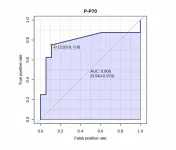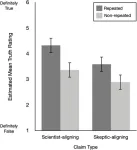(Press-News.org) The American College of Cardiology (ACC) and the Cardiological Society of India will host ACC Asia 2024 on August 16-18 in Delhi, India. This conference will bring together all members of the cardiac care team to examine emerging trends and best practices for cardiovascular disease patient care.
“One of the most meaningful outcomes of the annual ACC Asia conference is the ability to communicate with other cardiologists to strategize and innovate new ideas,” said Eugene Yang, MD, MS, FACC, one of the ACC Asia conference co-chairs. “As a global community, we all share a common goal to transform cardiovascular care for all.”
The conference offers an opportunity for attendees to connect and exchange ideas with regional and global colleagues. Participants will be able to utilize the newest strategies in cardiovascular diagnosing and treatment, multi-modality imaging and more.
“It is critical for all members of the cardiac care team to become well-acquainted with the very latest in cardiovascular care innovation. ACC Asia puts the spotlight on emerging trends for treating patients with cardiovascular disease, giving attendees the tools they need to elevate their practice,” said Pratap Chandra Rath, MD, DM, FACC, ACC Asia’s conference co-chair.
During the meeting, three ACC Asia chapter teams will compete in ACC FIT Jeopardy, a friendly competition between ACC Fellows-In-Training that tests their clinical knowledge. The ACC Asia chapter teams are quizzed on a variety of cardiology-based topics, including prevention, imaging and interventional cardiology. The winning team will compete at the ACC.25 FIT Jeopardy competition in Chicago in March 2025.
The conference will feature can’t-miss educational sessions, such as:
Air Pollution and Cardiovascular Disease: A Window of Opportunity
Artificial Intelligence in Cardiology: Hope For the Future
Heart Failure Management: Global Perspectives
The Growing Epidemic of Obesity: Lifestyle and Therapeutic Interventions
Learn more about the meeting and see the full agenda here.
NCD Academy Symposium
During ACC Asia 2024, conference attendees will have the opportunity to join the NCD Academy symposium on Saturday, August 17 at 12:40 p.m. IST. The event will feature a keynote by Dorairaj Prabhakaran, MD, DM, MSc, on Integrated Care in Disease Management, followed by a discussion led by the session chairs, ACC President Cathleen Biga, MSN, FACC, and ACC Asia Co-Chair Eugene Yang, MD, MS, FACC. To learn more about the NCD Academy program and its free, on-demand courses accessible anytime, anywhere, visit ACC.org/NCDAcademy.
Clinical Cases and Poster Presentations
The following list provides a brief look at the clinical cases and posters to be presented during the ACC Asia 2024 conference. All clinical cases and poster abstracts are embargoed until Thursday, August 15, 2024, at 1700 India Standard Time/7:30 a.m. Eastern Daylight Time.
Duration of Workplace Noise Exposure and Blood Pressure Among Rural Adult Weavers
Effects of Long-term Caffeine Consumption on Recovery of Heart Rate and Blood Pressure to Baseline Levels: A Cross-Sectional Study
Global Burden of Cardiovascular Disease Attributable to Sugar-Sweetened Beverages in Middle Adults, 1990-2019
How to Register as Media
Please reach out to the ACC Press Office to request media registration or to receive embargoed copies of posters. All registrants will be required to provide appropriate documentation and/or media credentials as per the ACC Media and Communications policies.
If you have questions, please contact the ACC Press Office at Julie Boyland, jboyland@acc.org.
The American College of Cardiology (ACC) is the global leader in transforming cardiovascular care and improving heart health for all. As the preeminent source of professional medical education for the entire cardiovascular care team since 1949, ACC credentials cardiovascular professionals in over 140 countries who meet stringent qualifications and leads in the formation of health policy, standards and guidelines. Through its world-renowned family of JACC Journals, NCDR registries, ACC Accreditation Services, global network of Member Sections, CardioSmart patient resources and more, the College is committed to ensuring a world where science, knowledge and innovation optimize patient care and outcomes. Learn more at www.ACC.org or follow @ACCinTouch.
###
END
Solving a decades-old problem, a multidisciplinary team of Caltech researchers has figured out a method to noninvasively and continually measure blood pressure anywhere on the body with next to no disruption to the patient. A device based on the new technique holds the promise to enable better vital-sign monitoring at home, in hospitals, and possibly even in remote locations where resources are limited.
The new patented technique, called resonance sonomanometry, uses sound waves to gently stimulate resonance ...
Researchers working on large artificial intelligence models like ChatGPT have vast swaths of internet text, photos and videos to train systems. But roboticists training physical machines face barriers: Robot data is expensive, and because there aren’t fleets of robots roaming the world at large, there simply isn’t enough data easily available to make them perform well in dynamic environments, such as people’s homes.
Some researchers have turned to simulations to train robots. Yet even that process, which often involves a graphic designer ...
CORNELL UNIVERSITY MEDIA RELATIONS OFFICE
FOR RELEASE: August 7, 2024
Kaitlyn Serrao
607-882-1140
kms465@cornell.edu
When is too much knowledge a bad thing?
ITHACA, N.Y. – A new study finds an increase in knowledge could be a bad thing when people use it to act in their own self-interest rather than in the best interests of the larger group.
Cornell University economics professor Kaushik Basu and Jörgen Weibull, professor emeritus at the Stockholm School of Economics, are co-authors ...
Many organisms react to the smell of deadly pathogens by reflexively avoiding them. But a recent study from the University of California, Berkeley, shows that the nematode C. elegans also reacts to the odor of pathogenic bacteria by preparing its intestinal cells to withstand a potential onslaught.
As with humans, nematodes’ guts are a common target of disease-causing bacteria. The nematode reacts by destroying iron-containing organelles called mitochondria, which produce a cell's energy, to protect this critical element from iron-stealing bacteria. Iron is a key catalyst in many enzymatic reactions in cells — in particular, ...
"This report suggests that a simple assay may allow cost-effective prediction of medication response."
BUFFALO, NY- August 7, 2024 – A new research paper was published in Aging (listed by MEDLINE/PubMed as "Aging (Albany NY)" and "Aging-US" by Web of Science), Volume 16, Issue 14 on July 26, 2024, entitled, “mTORC1 activation in presumed classical monocytes: observed correlation with human size variation and neuropsychiatric disease.”
In this new study, researchers Karl Berner, Naci Oz, Alaattin Kaya, Animesh Acharjee, and Jon Berner ...
MINNEAPOLIS – There’s some good news for people with Parkinson’s disease: The risk of developing dementia may be lower than previously thought, or dementia may occur later in the course of the disease than previously reported, according to a study published in the August 7, 2024, online issue of Neurology®, the medical journal of the American Academy of Neurology.
“The development of dementia is feared by people with Parkinson’s, and the combination of both a movement disorder and a cognitive disorder can be devastating to them and their loved ones,” said study author Daniel Weintraub, MD, ...
Long-term exposure to contaminants such as arsenic and nitrate in water is linked to an increased risk of various diseases, including cancers, cardiovascular diseases, developmental disorders and birth defects in infants. In the United States, there is a striking disparity in exposure to contaminants in tap water provided by community water systems (CWSs), with historically marginalized communities at greater risks compared to other populations. Often, CWSs that distribute water with higher contamination levels exist in areas that lack adequate public infrastructure or sociopolitical and financial resources.
In ...
Living less than about one-third of a mile from pesticide use prior to conception and during early pregnancy could increase the risk of stillbirths, according to new research led by researchers at the Mel and Enid Zuckerman College of Public Health and Southwest Environmental Health Sciences Center.
Researchers found that during a 90-day pre-conception window and the first trimester of pregnancy, select pesticides, including organophosphates as a class, were associated with stillbirth.
The paper, “Pre-Conception ...
Affective sensitivity to air pollution (ASAP) describes the extent to which affect, or mood, fluctuates in accordance with daily changes in air pollution, which can vary between individuals, according to a study published August 7, 2024 in the open-access journal PLOS ONE by Michelle Ng from Stanford University, USA, and colleagues.
Individuals’ sensitivity to climate hazards is a central component of their vulnerability to climate change. Building on known associations between air pollution exposure and ...
Climate science supporters rated climate-skeptical statements as “truer” after just a single repetition, according to a study published August 7, 2024 in the open-access journal PLOS ONE led by Mary Jiang from The Australian National University, Australia, and coauthored by Norbert Schwarz from the University of Southern California, USA, and colleagues. The results held true even for the strongest climate science supporters surveyed.
Amidst the influx of content that a person consumes each day, the principle of motivated ...






